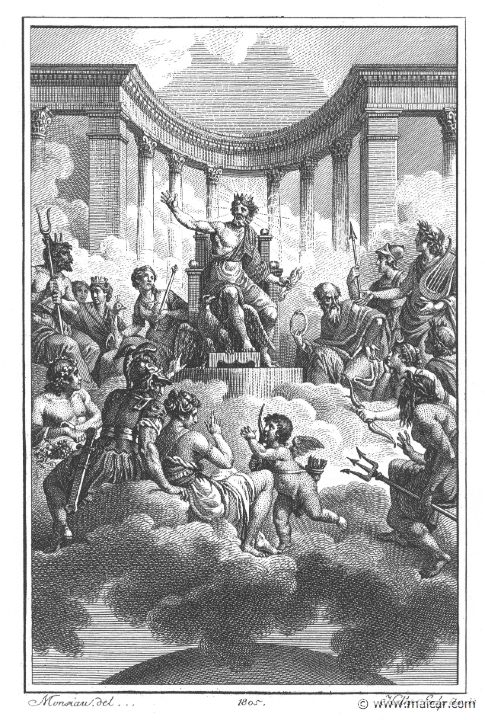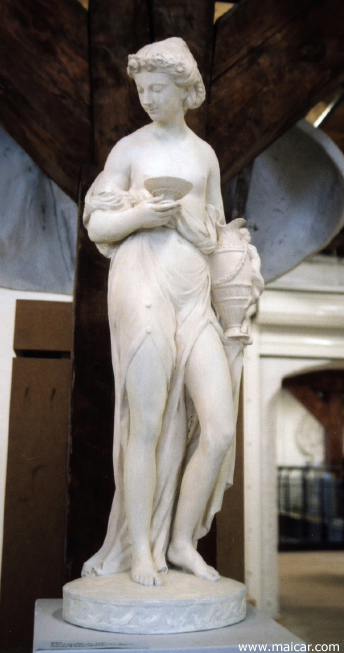|

|
Gods assembled: In the line behind and from left to right: first Hades, holding his two-forked sceptre, the mother of the gods Rhea 1, and between her and Hera is Hera's peacock. Zeus sits in the middle with the eagle at his feet, holding the thunderbolt in his hand. To his right sits Cronos holding the ouroboros, and standing are Athena and Apollo. Under the latter Artemis, with a half-moon adorning her head, is seen holding her bow. In the first line and from left to right: Dionysus 2 is seen reclining. Ares in armour sits close to Aphrodite who looks at Eros as he comes towards her. In the far right sits Poseidon holding his trident. villenave01017: Drawing by Nicolas-André Monsiau 1754-1837 (Les Métamorphoses d'Ovide, Paris 1806).
|
|
|
|
"Olympus is the abode of the gods that stands fast forever. Neither is it shaken by winds nor ever wet with rain, nor does snow fall upon it, but the air is outspread clear and cloudless, and over it hovers a radiant whiteness. Therein the blessed gods are glad all their days..." (Homer, Odyssey 6.42).
"Thus the whole day long till the setting of the sun the Olympians feasted, nor did their heart lack anything of the equal feast, nor of the beauteous lyre, that Apollo held, nor yet of the Muses, who sang, replying one to the other with sweet voices. But when the bright light of the sun was set, they went each to his own house to take their rest, where for each one a palace had been built with cunning skill by the famed Hephaestus, the limping god; and Zeus, the Olympian, lord of the lightning, went to his couch, where of old he took his rest, whenever sweet sleep came upon him. There went he up and slept, and beside him lay Hera of the golden throne." (Homer, Iliad 1.601).
|
|
OLYMPIANS are called the gods who live in the House of Olympus, which sometimes means heaven but is also a mountain in Pieria, a region of Thessaly in northern Greece. The Olympian gods, presided by Zeus, came to rule the universe after they overthrew the TITANS (see also Titanomachy). The gods, being immortal, neither eat bread nor drink wine, wherefore they are also bloodless. Instead they drink and eat Nectar and Ambrosia and their blood is called Ichor (see also Mythical Objetcs). The lists below include all OLYMPIANS, i.e. both the first generation (Cronides) and the second, sprung from the first. Among them are also counted the lords of the sea and the Underworld.
Demeter.
Goddess of fertility.
Demeter has been represented holding Sheaves of Corn, Poppies and Snakes. These symbols relate to Demeter's nature as a goddess of fertility and divinity of the earth.
Hades.
Ruler of the Underworld.
Hades is known to own a Helmet which makes him invisible, and therefore when we see the Helmet we cannot see Hades, who is only visible when he does not wear it. He is also seen holding a two-pronged staff.
Hera.
Queen of Heaven.
The Emperor Hadrian once dedicated a Peacock of gold and gleaming stones because the Peacock was held to be the bird sacred to Hera. The Pomegranate also has appeared as an attribute of Hera but the reason for this is said to be a holy mystery. The Cuckoo is also a bird sacred to Hera because when Zeus was in love with Hera he changed himself into a Cuckoo, and she caught it to be her pet.
Hestia.
Goddess of the hearth.
Poseidon.
Ruler of the sea.
The Trident, which he received from the CYCLOPES, is Poseidon's best known attribute. Poseidon is associated to Horses, which were first tamed by him, and also to Bulls. Poseidon is often depicted with a Dolphin, probably the same Dolphin which persuaded Amphitrite to marry this god.
Zeus.
Ruler of Heaven.
Zeus' main attribute is the Thunderbolt, which he received from the CYCLOPES. The s is Zeus' bird. An Eagle was seen by Zeus as an omen for attacking the TITANS, and an Eagle snatched Ganymedes. Zeus approached Aegina in the form of an Eagle. An Eagle punished Prometheus 1 who defied Zeus, and an Eagle brings back the Thunderbolts which Zeus has flung. This is why an Eagle is often depicted at his feet. Zeus' Aegis (see also Athena below), which was made by Hephaestus is indestructible, and when he shakes it a storm and thunder ensues. The oak is Zeus' tree.
Aphrodite.
Goddess of the tender passions.
The Rose and the Myrtle are sacred to Aphrodite and said to be connected with the story of Adonis. The Dove is Aphrodite's bird. Doves sat on a wonderful egg which had fallen into the Euphrates River, and when the egg was heated it hatched out Aphrodite. Aeneas, Aphrodite's son, recognised his mother's help in the Doves which showed him the place where a certain Golden Bough, a key to the Underworld, was hidden. Since ancient times Aphrodite has been depicted as coming out from a Shell. Aphrodite is often seen holding an Apple, the prize of beauty she won in the Judgement of Paris. The Golden Apples of Aphrodite should also be remembered; because of them Atalanta lost the race and had to marry.
|

|
Hebe: the eternal youth of the gods. 8836: Hebe. J.-F.-J. Saly (1717-1776), 1753. Marmor. Victoria & Albert Museum, London (Royal Cast Collection, Copenhagen).
|
|
|
|
Apollo.
Prophecy and healing.
The Bow and the Quiver are the attributes of this god who strikes from afar, and also the Lyre, which some say was invented by Hermes.
"The lyre and the curved bow shall ever be dear to me, and I will declare to men the unfailing will of Zeus." (Apollo. Homeric Hymn to Delian Apollo 131).
A couple of Crows has been associated with Apollo who cursed one of them and it became black instead of white. A man called Aristaeas said he turned into a Crow when he followed Apollo. Since Daphne 1, pursued by Apollo, changed into a Laurel tree, the god is associated with the Laurel because he broke a branch from the tree and placed it on his head.
Ares.
God of war.
Artemis.
Goddess of hunters, and protectress of the wilderness.
Artemis is often represented with the Bow and Quiver of the huntress and with emblems representing the Moon and the Stars. She is often seen in the company of a Hind or a Dog.
Athena.
Goddess of warriors, industries and prudent intelligence.
The Aegis, usually a goat skin, is an attribute of both Athena and Zeus. Athena's Aegis is surrounded by Fear, Strife, Force and Pursuit or sometimes by snakes, and in the center there is the Gorgon's head (see Medusa 1). The Owl is Athena's bird, but sometimes she has been depicted with a Cock on her helmet and it has been assumed that the Cock might have been considered as sacred to her. Others say that the Cock is sacred to Helius (Sun) and proclaims when he is about to rise. The Olive is her tree.
Dionysus 2.
God of the vine
The Thyrsus, a staff that is crowned with ivy, is sacred to Dionysus 2 and an emblem of his worship. Also Vine Leaves and Bunches of Grapes are associated with him
Hebe.
Cup-bearer in Olympus.
Hebe is Youth.
Hephaestus.
The smith of Heaven.
This god, who tames fire and was once called to chain Prometheus 1, the thief of that same element, is mostly seen with oval cap and the hammer and tongs of the smith.
Hermes.
Messenger of Zeus.
The Petasus, which is a round winged hat and the Winged Sandals are two well known attributes of Hermes. Another one is the Caduceus, which is a winged staff entwined with two serpents (the medical emblem resembles this, but it is not the same). According to some Hermes received the Caduceus, which is a golden staff or wand, from Apollo who used it while he herded cattle, in exchange for a flute that Hermes had invented. The Caduceus is a splendid staff of riches and wealth, which keeps Hermes scatheless.
Persephone.
Queen of the Underworld.
The Pomegranate is associated with Persephone. Because of having eaten a seed or seeds of Pomegranate Persephone became for ever bound to Hades.
The "Twelve gods", mentioned in several sources, have not been fully identified by posterity nor included in an authoritative list. Ancient lists are apparently not known. Walter Burkert in his Griechische Religion der archaischen und klassischen Epoche (Greek Religion—translated by John Raffan, Oxford 1985, chapter III, page 125) presents the twelve gods as follows: Zeus, Hera, Poseidon, Athena, Apollo, Artemis, Aphrodite, Hermes, Demeter, Dionysus, Hephaestus, and Ares. But he also points out that Hestia is often substituted for Dionysus and that other divergences also occur: "In Asia Minor a group of Twelve Gods had long been known. The Greeks correspondingly came to assemble their most important gods in a society of twelve. The number is fixed; some names vary, especially Hestia / Dionysus." (Walter Burkert, Greek Religion).
| Close to the OLYMPIANS are: |
|
Bia. Force (see PERSONIFICATIONS).
CHARITES, in the train of Aphrodite.
Cratos. Power (see PERSONIFICATIONS).
Dione 1 (see Aphrodite).
Eos. Dawn.
Eros. Love.
Ganymedes. Cup-bearer in Heaven.
Helius. The Sun.
HORAE. Wardens of the gates of Heaven.
Ilithyia. Goddess of childbirth (see Other Deities).
Iris 1. Heavenly messenger.
Leto. Titaness, mother of Apollo and Artemis.
MUSES.
Nemesis. Retribution, divine vengeance.
Nike. Victory.
Paeeon. Universal healer (see Other Deities).
Selene. The Moon.
Themis. Titaness. The laws.
Zelos. Emulation (see PERSONIFICATIONS).